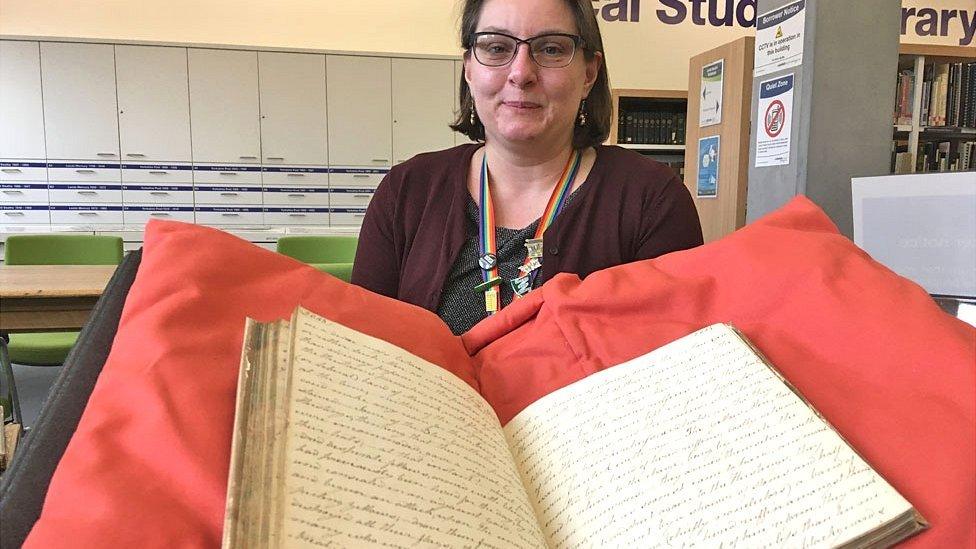The BBC's First Homosexual: How we made 1950s work into a play
- Published
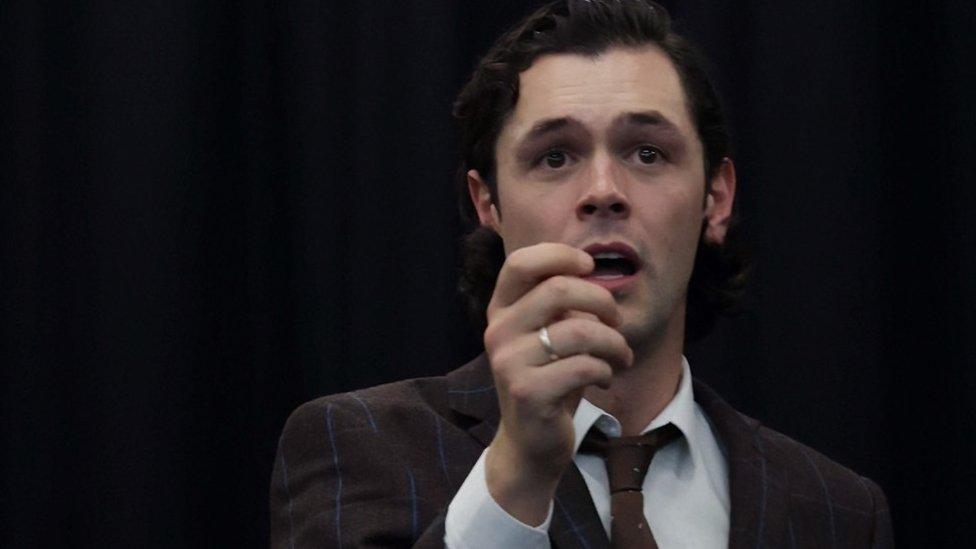
The play combines the original script with the fictional tale of a young man in 1950s Britain
In 1957, the BBC broadcast its first radio documentary about gay men. The Homosexual Condition had taken three years to come to air, amid a climate of considerable oppression in which you could still be imprisoned for being gay.
The documentary was later lost but, following the efforts of a Leicestershire academic and an award-winning writer, a play named The BBC's First Homosexual has been created about it which is having its first performance on Thursday. The people behind it explain the challenges they faced along the way.

'It provoked so much reaction'
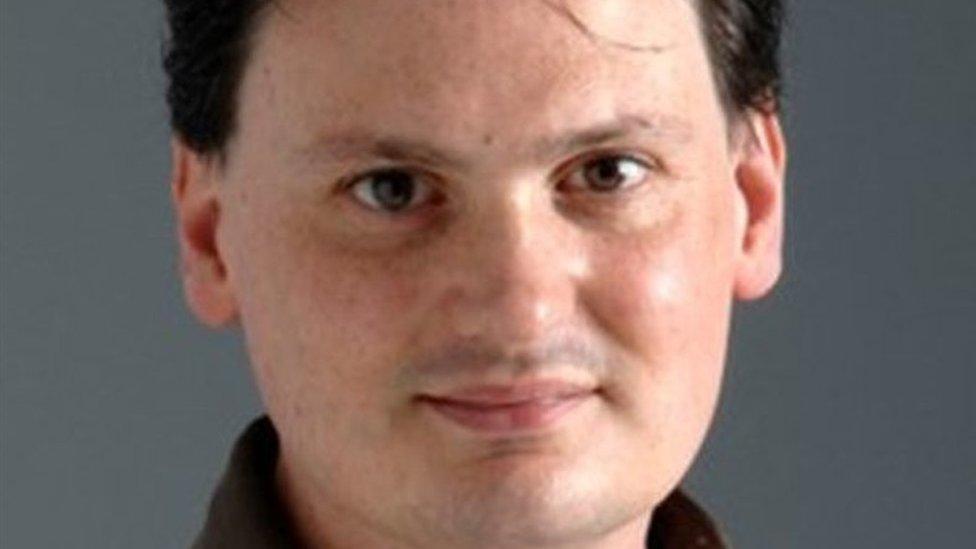
Dr Collins unearthed materials about the production from the BBC archives
Seven years ago Dr Marcus Collins was standing in the BBC Written Archives Centre in Reading feeling bored.
Marcus, an expert in social change in post-war Britain at Loughborough University, had grown tired of the project he was working on when his eye chanced upon something completely different - a large file, containing paperwork relating to a controversy in the 1950s.
Intrigued, he read on to discover the lost script of one of the BBC's first attempts to examine the lives of gay men - a documentary named The Homosexual Condition, which had been broadcast on the Home Service.

Jordan Tweddle plays one of the lead roles in the new production
It had been recorded on 24 May 1954 but was considered so taboo that it had not been broadcast until 25 July 1957.
"The recording had been lost in the mists of time," he says. "What was unusual was the amount of paperwork that was kept and the reason for that was that it provoked so much reaction at the time."
As he examined the papers, Marcus found the original script for the documentary, as well as memos from those behind it and letters detailing the reaction from listeners - including one from a gay man who had described it as a calumny.
At the time the BBC made the documentary, people were being sent to prison for being gay.
"The question arose about whether you could actually have any homosexual people on the programme, given that it was a criminal offence," says Marcus.
The programme makers eventually opted to interview somebody who had been sentenced for gross indecency but who appeared to consider himself "reformed".
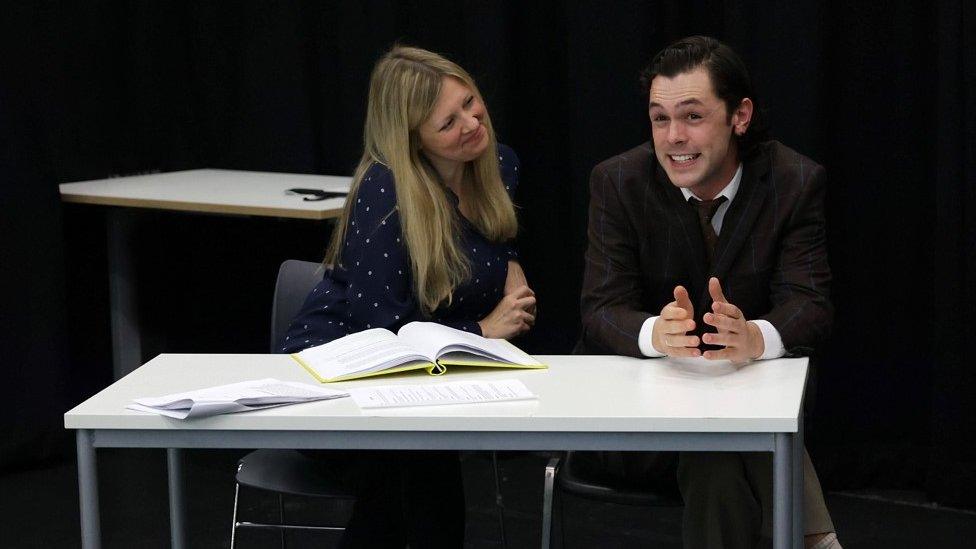
Those behind the play say it helps interrogate the attitudes of 1950s Britain
Marcus admits such terminology would sit uneasily with a modern audience.
"It's a situation where you have a whole bunch of straight men who don't now much about homosexuality pronouncing on the subject with a great deal of certitude," he says.
"To me the programme is just farcical. There's a tremendous amount of ignorance at the time and not a lot of places to look to for expertise.
"All of the assumptions within the BBC about the broadcast tell you more about the person writing the memo than about what it was like to be gay in the 1950s."
The programme was mothballed for several years before eventually being broadcast at around the time of the Wolfenden Report which recommended a partial decriminalisation of homosexuality.
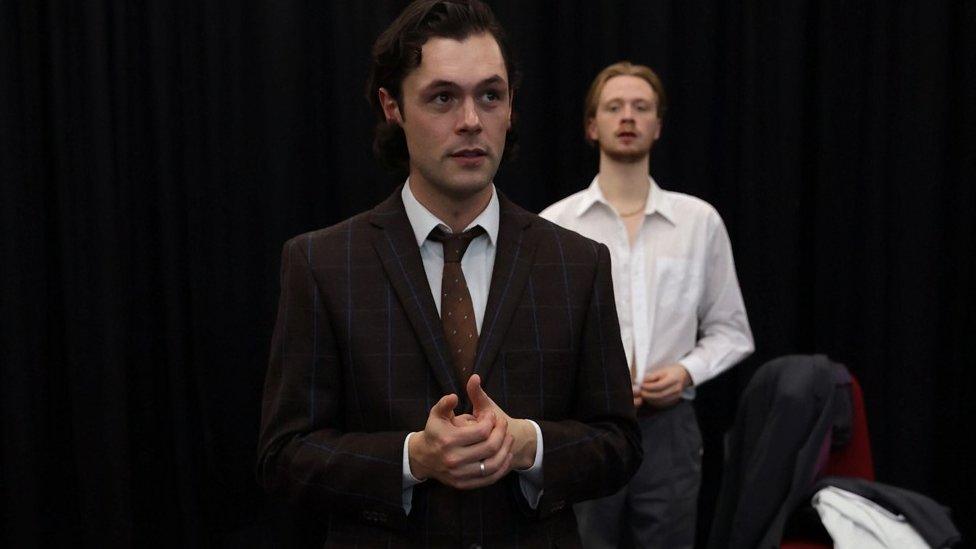
Marcus felt the script was ripe for dramatisation
Following its broadcast and the subsequent reaction, the director general at the time - Sir Ian Jacob - committed to refrain from broadcasting any further content relating to homosexuality, apart from for "special purposes".
But, despite its flaws, positive things did emerge as a result of the broadcast. Much of the reaction was positive and reviews, Marcus says, were largely sympathetic.
The programme's presenter C.R. Hewitt went on to help found the Homosexual Law Reform Society, which campaigned for changes to the laws that criminalised homosexuality.
"These kind of programmes were so rare they were actually quite important for people because they actually received some kind of recognition for their own identity," says Marcus.
As he read the script, he felt the process that had brought it into being was ripe for dramatisation.
Now working as a research fellow for the Arts and Humanities Research Council to work on events for the BBC's centenary year, he came into contact with playwright Stephen M Hornby.
Stephen is currently the National Playwriting in Residence for LGBT+ History Month.
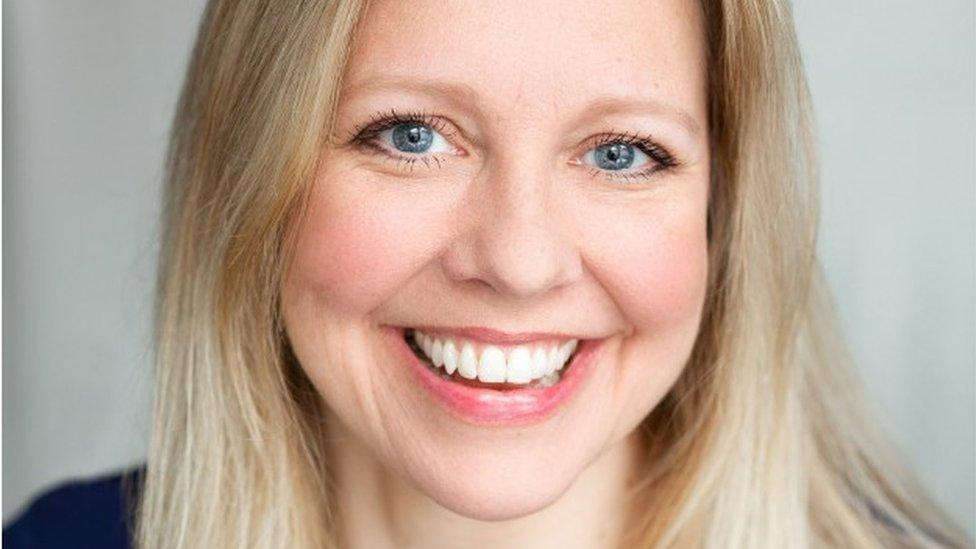
Actress Emily Heyworth plays a number of roles in the new stage production
He has put together a play that focuses on three strands - parts of the verbatim transcript, the BBC's processes of making the documentary and a fictionalised account of a young man growing up in Scunthorpe and coming to terms with his sexuality.
The play is being staged by Inkbrew Productions as a script-in-hand performance in the New Adelphi Studio at the University of Salford on Thursday but Marcus hopes it will become a full production early next year.
"We wanted to find a creative way of bringing these scripts back to life," he said. "There's so much stuff in the BBC archives that captures those times and the very different attitudes.
"Those attitudes are a million miles away from many people's attitudes these days but that's all the more reason why we should be able to understand why people thought that way and how we have changed."

Being gay in 1950s England
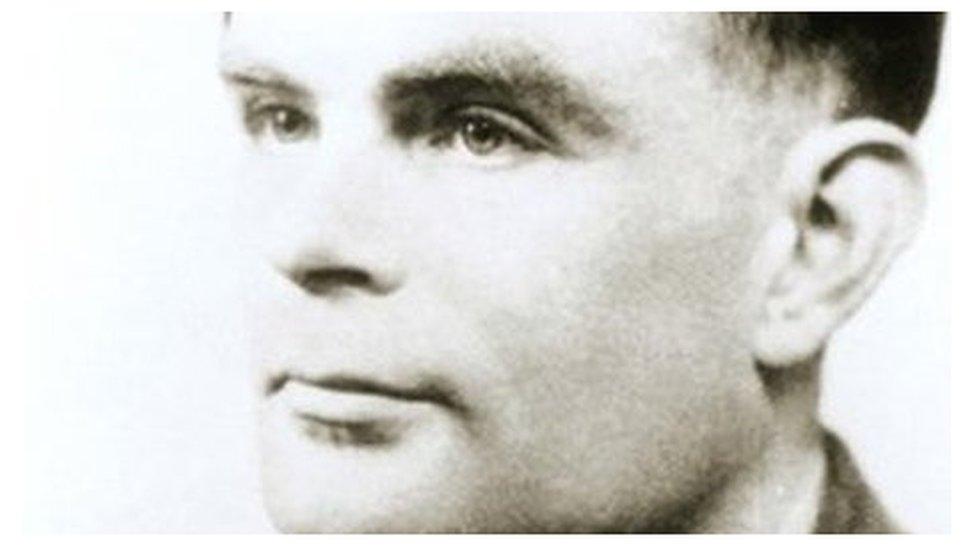
The arrest of Alan Turing and other celebrated figures highlighted the injustice of the laws
The years following World War Two saw a rise in the arrests and prosecutions of gay men, external.
Some - such as wartime codebreaker Alan Turing and knighted actor Sir John Gielgud - were high-profile figures. Such cases - and Turing's death in 1954 - led some to call for a review of the law.
In 1957 The Wolfenden Committee published its report into the laws on homosexuality and prostitution. It recommended a partial decriminalisation of sex between men over 21 in private. But a change in the law took another 10 years to get through parliament.

'How do you stage a load of offensive nonsense?'
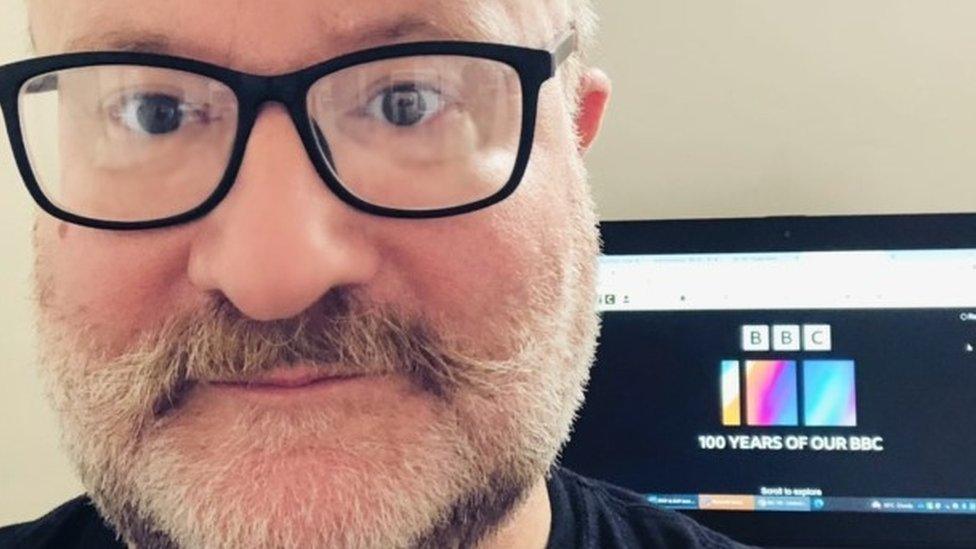
Stephen M Hornby specialises in playwriting from archives
"Turning a radio documentary made in 1954 into a stage play for now has some big challenges," says Dr Stephen M. Hornby.
Stephen specialises in writing plays based upon archive material but, in this case, he says there were particular difficulties.
"The basic concept of the original documentary is that an everyman journalist looks at a social problem, talks to so-called experts in different fields about it and comes to a balanced conclusion," he says.
"It's very different to how documentaries are made now.
"The experts don't actually possess much expertise and the view of homosexuality is an othering one.
"It's framed as a problem for society and as an illness of the individual that should be cured. So, it's basically a load of offensive nonsense. How do you stage that?"
'Window into period'
He decided the new work needed a narrative and a character for the audience to invest in.
"Firstly, there's a real story, which is of the internal struggle in the BBC to make the documentary," he says.
"There's only one man in the whole programme who talks openly about same sex experiences and he's paraded as a 'cured homosexual'.
"So, I wanted an actual homosexual to be the centre of the play. And that's the second story, which I've invented, of Tom, a working-class shop assistant from Scunthorpe.
"He acts as our window on to the period. Through a series of monologues, he takes us with him as he discovers and experiments with his sexuality.
"He's in a void though as the culture around him tells him almost nothing about homosexuality, except for reports of a few high-profile men being arrested.
"His journey leads him ultimately to listening to the broadcast of the documentary on the BBC Home Service in 1957 and we see its life-changing impact upon him.
"We know today, something that he discovers then: the power of being seen."
The original documentary featured interviews with psychoanalysts claiming they could "cure" gay men - what is known today as the "unethical and potentially harmful" practise of conversion therapy.
"It's extraordinary that no-one would be given a platform now to say the things the 'experts' say in the documentary, but the conversion therapy many of them advocate is still being practised," says Stephen.
"That's why it's important that these parts of the lost queer past are exposed and interrogated, so that we can see where the present has come from and better understand it.
"The ghosts I've awoken in The BBC's First Homosexual are telling us something profound about Britain today.
"And the authority and credibility that the BBC gave to conversion therapy with this documentary is something that still haunts us all.
"It's a shameful part of their legacy which, with the commissioning of this play, they are finally beginning to face up to."

'Insightful and sometimes challenging'
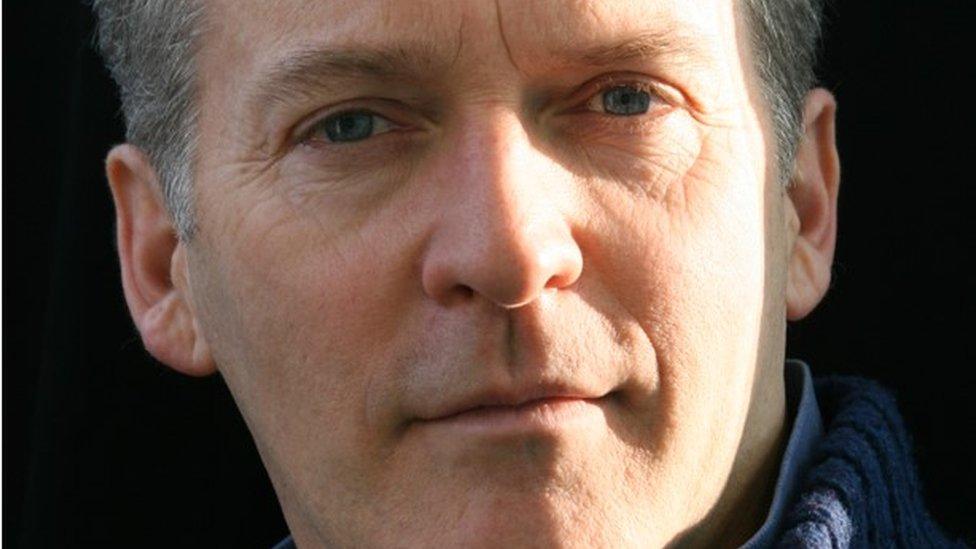
Robert Seatter described the revisiting of the BBC's archives as both insightful and challenging
Robert Seatter is the head of BBC History. He commissioned the work as part of the BBC 100 celebrations to mark the corporation's centenary.
He says: "This fascinating project takes an interesting creative route to interpreting the BBC at the heart of a changing Britain - when sexual identity was finally starting to be more broadly discussed and debated.
"As part of the BBC's centenary, I'm delighted that our archives are being brought to life in this insightful and sometimes challenging way."
He said the project was one of a number of pieces of work about the role the corporation has played in people's lives.
"The project is one of a number of research projects, exploring the BBC's impact on a range of different communities over time - from Black and Asian to LGBTQ, from health stories around the UK to young film makers using archive to tell their own contemporary stories," he says.

Follow BBC East Midlands on Facebook, external, on Twitter, external, or on Instagram, external. Send your story ideas to eastmidsnews@bbc.co.uk, external.
Related topics
- Published18 November 2022

- Published10 February 2020
